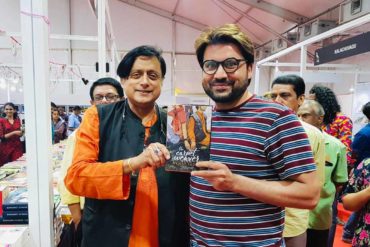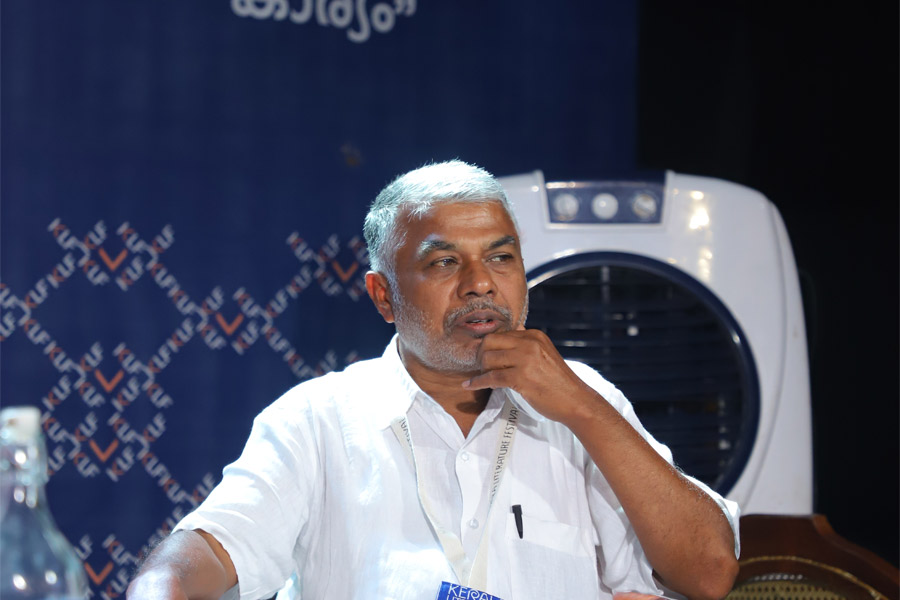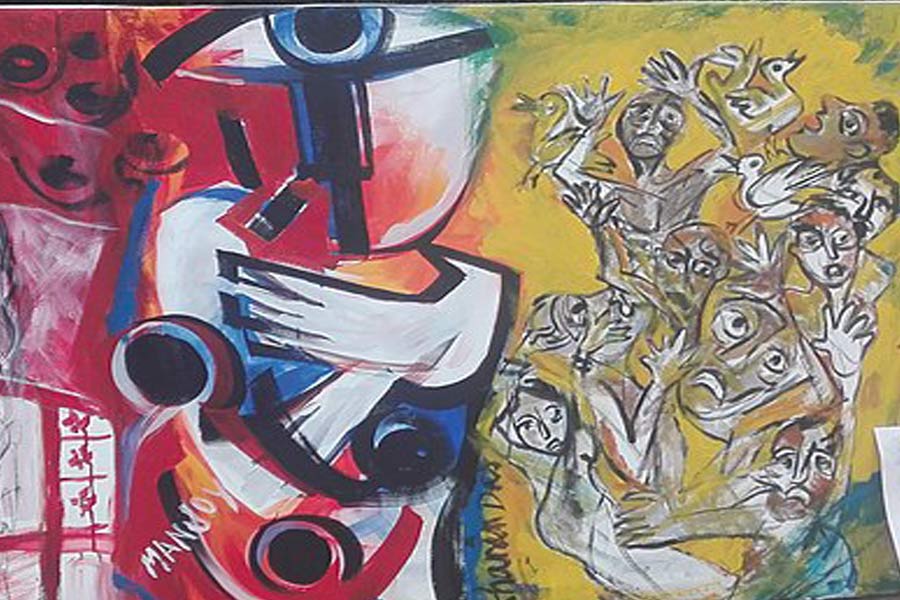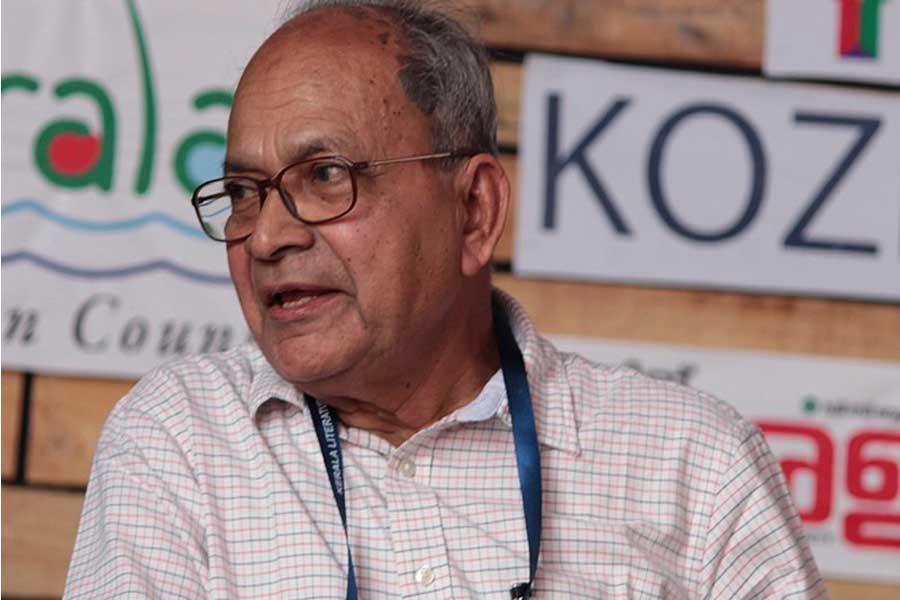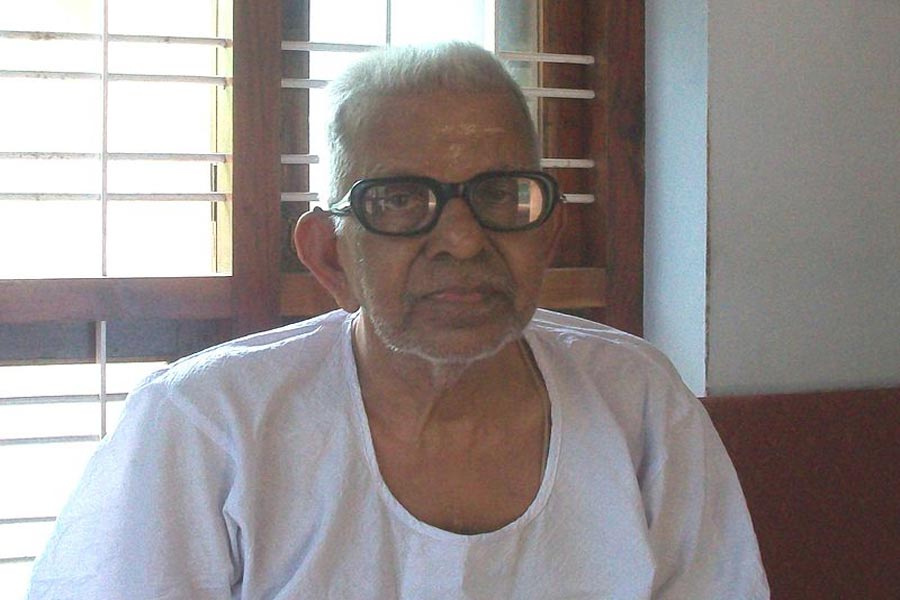Sometime ago, Ramchandra Guha had raised a very pertinent question: where are the intellectuals of the right-wing? The answer, it seems, is blowing in the wind. The Malayalam poet Akkitham’s winning of the prestigious Jnanpith award instituted by the Jain family, has not come as a surprise.
Whether it be his sharing the dais with functionaries of right-wing outfits or espousal of their causes, Akkitham has never been apologetic about his political leanings. His choice is going to be a controversial one for sure, much like other recent awards of similar stature.
Akkitham’s sublime talent and erudition make him unique among the poets of his generation. It is often said of the English poet laureate William Wordsworth that 90 per cent of his poetical oeuvre comprised platitudes, compiled as part of his official duties as court poet. But the rest of his poems were of such a rare magnificence and skill that they have sealed his place for eternity. The same could, in fact, be said of Akkitham.
A deceptive simplicity graces his poems even as he uses a dense Sanskritic vocabulary to articulate it. Patriotism, love and conjugal bliss merely accentuate his devotional piety. Veeravaadam, published in 1944 was Akkitham’s first poetic anthology.
T S Eliot in his celebrated essay Tradition and Individual Talent says that “no poet, no artist of any art, has his complete meaning alone”. This could be said of Akkitham Achuthan Namboothiri as well. Akkitham comes at the end of a long line of classical poets. South India has remained a bulwark of that great unbroken, continuous Indic tradition.
Neither the emerging subaltern nor the bourgeois capitalist elite of today could lay claim to that Sanskritic Indian tradition as much as the erstwhile feudal aristocracy and its elite. Akkitham finds himself in that exalted league of first boys, a chip off the old block.
He moves like a gentle colossus beneath the shade of that once great cosmopolitan classical literary tradition, as Sheldon Pollock would say. The so-called ‘sattvic’ energies still predominate in Akkitham’s poetry. Dissenters might though say that he is a slightly glorified version of the poetical satirist Chemmanam Chacko.
Despite works such as Kuttappan the Komaram and Gramalakshmi, Akkitham’s stylistic inability to articulate the subaltern lived experience, even as he descends from lofty philosophical heights into the humdrum everyday, is a major blind spot in his otherwise visionary oeuvre. His grasp is even less sure when it comes to the lived experience of the downtrodden.
But Akkitham is a liberal in the classical mould rather than a socialist. He is an Advaitin in the sense that he sees the world not dialectically, but as a single undifferentiated whole. Thus he attempts to effect a merger of different horizons through his poetry. Even in the famed lines from Akkitham’s masterly Irupatham Noottandinte Ithihasam (Epic of the 20th Century), “Luminosity is but sadness my child/ Mere darkness brings pleasure”, the poet is driving at a primordial undifferentiated abyss rather than a conflicting duality of darkness and light.
Akkitham in his poems such as Veendum Thunchanparambil (Again in Thunchanparambu) pays homage to Ezhuthachan, the original master of Malayalam poetry. Akkitham writes:
“Wrong though it might be, or even if it’s true
Impossible would it be for me, to kick away,
In this incandescent noon, the earthly life;
Even as flowers keep smiling in the courtyard’’
Akkitham, (Veendum Thunchanparambil)
Thus he follows a classical paradigm of retracing the masters of yore, while bringing the vigour of romantic individualism as well into his oeuvre. There is a conflict between classical tradition and the individual genius in Akkitham. Even as he holds aloft the precepts of classical poetry, Akkitham also consigns some of them to the sacrificial fire.
While the ever-beloved Kunjunni Mash could never have won the Jnanpith, owing to the Mughal miniature-like crafting of his ouevre, there is somewhere in Akkitham, a Kunjunni Mash going berserk. His poetical energies are intensely focussed and yet show a palpable feeling for the bizarre as well as the mundane.
Akkitham mostly writes with an Upanishad-like equanitmity. The vedantic argument that ‘the waves are not the ocean’ is beloved to Akkitham. The manifest reality of the waves cannot comprise the deeper reality of the ocean. In his poems, a wholly different lived reality and imaginative universe manifest themselves. The residual elite culture carries the day.
Akkitham’s efforts to deal with modernity in his poems have although been less effective, even as he espouses a uniquely Indian version of liberalism in poems such as Bharatheeyante Ganam (Song of the Indian).
All the Jnanpith winners from Malayalam so far have been noted for their ability to articulate a pan-Indian idiom. G Sankara Kurup, the first-ever winner of the Jnanpith in any Indian language, in 1965, was in typical neo-classical fashion following in the mystical footsteps of the national poet Rabindranath Tagore.
S K Pottekkad in 1980 won the award for his Oru Deshathinte Katha. He was a story teller par excellence as well as a writer of majestic travelogues, somewhat in the mould of the legendary Rahul Sankrityayan who also wrote novels in addition to being a masterly travel writer.
Thakazhi Sivasankara Pillai, winner of the Jnanpith in 1984 was a master of the local tale, or sthalapurana. Thakazhi was one of those rare genuinely narrative story tellers to have emerged at a time when experimentalist modernism and urban superficiality were running riot.
M T Vasudevan Nair who won the Jnanpith in 1995, is perhaps India’s greatest living chronicler of the desolateness of crumbling aristocratic households. His novels thus could find a resonance in other parts of the country as well, making him a household name.
The 2007 winner O N V Kurup is perhaps the odd man out in this group, with his strong Communist convictions. But his left-leaning progressivism was easily relatable to a national audience weaned on the progressive writers’ movement, helmed by the likes of Sahir Ludhianvi, Munshi Premchand and Mulk Raj Anand.
Akkitham in 2019 is the latest entrant to this list with his Bhartrhari-like extreme ambivalence, oscillating between cold detachment and passionate enchantment. All of these writers, perhaps with the exception of O N V, espoused vernacular modernity of local provenance, without breaking away from conservative Indian tradition.
In a scatter diagram of tradition versus modernity, M T would easily be identifiable as one of muscular modernity, whereas Akkitham, is a traditionalist and arch-conservative in the classical mould. Akkitham’s Jnanpith is also an indicator of the old poetic guard asserting itself. It is also an index of the exclusion of subaltern experience and epistemological traditions from the national mainstream.

